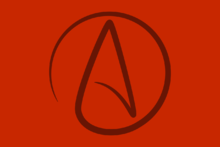Secularism is an ideology based on the principle of conducting human affairs based on non-religious and naturalistic considerations only.
Beliefs
Secularism is most commonly defined as the separation of religion from civic affairs and the state and may be broadened to a similar position seeking to remove or to minimize the role of religion in any public sphere. The term "secularism" has a broad range of meanings, and in the most schematic, may encapsulate any stance that promotes the secular in any given context. Secularism is opposed to both state atheism and theocratic rule, since it regards people's rights to practice their religious beliefs freely, both of these governmental systems are opposed to secularism since they try to force beliefs onto people.
 Anti-Clericalism
Anti-Clericalism

Anti-Clericalism is a form of secularism that shows opposition to religious authority in social and political matters. This differs from normal secularism in the sense that Anti-Clericalism regards religious authority as harmful and something that should be opposed while Secularism takes a neutral stance on religion. Anti-Clericalism has been practiced commonly under state atheist countries but also has been practiced under Anarchists who have been historically hostile to religious authority because they see it as another source of oppression like the state. Although not everyone who is anti-clerical is anti-religious, anti-clericalism has its roots in religious people protesting against religious authority like under the protestant reformation, but also under the French Revolution where the clerics were murdered. So, the reasonings of why and who is opposing religious authority are different for each situation.
History
Anglo-American Secularism
Secularism in the Anglo-American sense finds it's roots within the Colonial era of America where, in 1636, Roger Williams established a settlement in Rhode Island. This settlement permitted total religious freedom. This, along with the later enlightenment philosophers such as John Locke, would go on to heavily influence the founding fathers of the United States.
As a result, the founding fathers would later would later enshrine within the first amendment of the constitution the foundations of American Secularism with what is known as the establishment clause. This clause states as follows: "Congress shall make no law respecting an establishment of religion, or prohibiting the free exercise thereof."
This established the primary purpose of American Secularism, which was not the total exclusion of religion from government (like in French secularism) but rather the inclusion of all religions in the government. This is made in order to ensure that no one religion is discriminated against and no religion is given too much power.
French Secularism
French Secularism, also called ![]() Laicism or Laïcité, is a stance regarding institutional religion which believes that religion and society shouldn't mix and faith should be left as a purely personal matter. Although laicism is commonly used interchangeably with secularism, it differs from the Anglo-American interpretation of secularism in the regard that the latter does not seek to make religion a purely personal matter, but to make the state free of it.
Laicism or Laïcité, is a stance regarding institutional religion which believes that religion and society shouldn't mix and faith should be left as a purely personal matter. Although laicism is commonly used interchangeably with secularism, it differs from the Anglo-American interpretation of secularism in the regard that the latter does not seek to make religion a purely personal matter, but to make the state free of it.
Introduced in 1905, secularism originally represented the victory of anti-clerical republicanism, which, ever since the French Revolution of 1789, had stigmatised the Roman Catholic Church as a bastion of reaction, ignorance and superstition. In concrete terms, the 1905 law dramatically limited the power of the Church by enshrining three key principles: strict separation of Church and State, freedom of conscience and freedom to exercise any faith.
In contemporary France, however, the conflict with the Roman Catholic Church is long dead, with the result that secularism has come to stand for something else: managing ethnic differences in a society that is diametrically opposed to the community based approach advocated in the English-speaking world. According to this modern schema, secularism is about avoiding Anglo-Saxon style ghettos; coming together as citizens; and transcending narrow religious differences.
Personality and Behavior
Secularism is an objective thinking ideology that likes to use the head rather than the heart. He gets along with ![]() Laicism, atheists, and ideologies that advocate for freedom of religion. He hates
Laicism, atheists, and ideologies that advocate for freedom of religion. He hates ![]() theocracies, superstitions, and religious extremists.
theocracies, superstitions, and religious extremists.
How to Draw

- Draw a circle.
- Fill it with white.
- Draw a blue atom in the center.
- Draw the eyes and you're done!
Relationships
Friends
 Laicism - Maybe comes off as a little authoritarian for my liking, but we're both united in making sure religion stays out of government.
Laicism - Maybe comes off as a little authoritarian for my liking, but we're both united in making sure religion stays out of government. Civil Libertarianism - We both support self-expression and allowing people to believe in whatever they want.
Civil Libertarianism - We both support self-expression and allowing people to believe in whatever they want. Kemalism - Great job turning Turkey into a secular state. Too bad that those Neo-Ottomanist buttholes ruined it.
Kemalism - Great job turning Turkey into a secular state. Too bad that those Neo-Ottomanist buttholes ruined it. El-Sisi Thought,
El-Sisi Thought,  Nasserism &
Nasserism &  Mubarakism - I like that you kept Egypt a secular state.
Mubarakism - I like that you kept Egypt a secular state. French Left-Conservatism,
French Left-Conservatism,  Goldwaterianism &
Goldwaterianism &  Humeanism - Best conservatives ever.
Humeanism - Best conservatives ever. Hitchenism &
Hitchenism &  Dawnkinism - Same as above but neocons. Probably the only two
Dawnkinism - Same as above but neocons. Probably the only two  radical atheists I like.
radical atheists I like. Religious Rejectionism - You are my religious equivalent.
Religious Rejectionism - You are my religious equivalent.
Frenemies
 Confessionalism - Well, as long as you don't try to interfere with your citizen's personal beliefs then I guess I can tolerate you. Though I definitely won't deny that Lebanon's system is just plain stupid and doesn't work at all.
Confessionalism - Well, as long as you don't try to interfere with your citizen's personal beliefs then I guess I can tolerate you. Though I definitely won't deny that Lebanon's system is just plain stupid and doesn't work at all. Hindutva - STOP CALLING ME "SICKULAR" YOU THEOCRAT MANIAC!!! Your "Positive Secularism" isn't the worst, I guess... but I don't trust it either.
Hindutva - STOP CALLING ME "SICKULAR" YOU THEOCRAT MANIAC!!! Your "Positive Secularism" isn't the worst, I guess... but I don't trust it either.
Enemies
 State Atheism - Let people have their beliefs!
State Atheism - Let people have their beliefs! Theocracies - Let people have their disbeliefs!
Theocracies - Let people have their disbeliefs! Neo-Ottomanism - Ataturk is better than you, filthy theocrat!
Neo-Ottomanism - Ataturk is better than you, filthy theocrat! Clerical Fascism &
Clerical Fascism &  Islamic Fascism - NO. PLEASE. NO.
Islamic Fascism - NO. PLEASE. NO.
Further Infomation
| | |